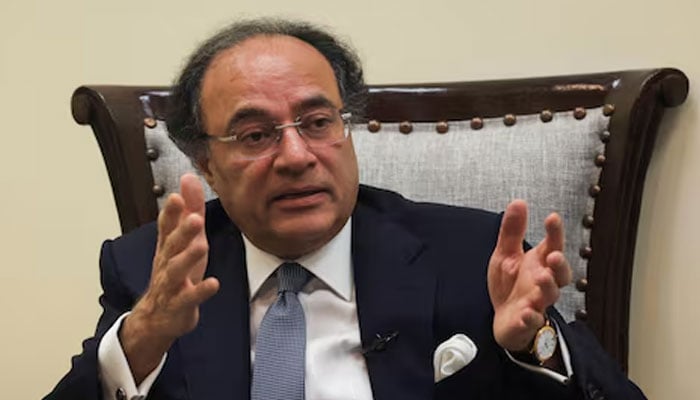Pakistan to talk to IMF, WB on climate resilience: Aurangzeb
Finance minister emphasises need for IMF to embed social protection measures in its lending frameworks
WASHINGTON: The World Bank is keen to work with Pakistan on issues like climate change and child stunting, said Federal Finance Minister Muhammad Aurangzeb here on Wednesday.
“We are going to be talking to the [International Monetary] Fund and the World Bank with respect to climate resiliency. We needed to have the EFF [Extended Fund Facility] in place and then we needed to start these discussions,” he said while speaking at a local think tank, Wilson Center.
“I can tell you President [WB] Ajay Banga, in the country partnership framework that we are working with his team, is very keen to work with Pakistan on these issues,” he told the audience, “We will prioritise climate finance. We need to operationalise a lot of stuff, what happened in Sharm el Sheikh in terms of Loss and Damage Fund, a little bit of movement in COP-28 around that, in 15 days when people meet in Azerbaijan we really need to utilise it so that countries like Pakistan can benefit from that.”
The 29th UN Climate Change Conference, commonly known as COP29, will be held in Baku, Azerbaijan, from 11 to 22 November this year. Aurangzeb emphasized the need for the IMF to embed social protection measures in its lending frameworks.
The finance minister on Tuesday attended the meeting of the Managing Director of the IMF with finance ministers, central bank governors and heads of regional financial institutions of the MENAP (Middle East and North Africa and Afghanistan and Pakistan) region.
In his intervention, he urged the IMF to focus on enhancing climate resilience financing and to continue expanding debt relief and concessional financing mechanisms to support vulnerable nations. He also welcomed the incorporation of emerging challenges such as climate-related risks, domestic public debt, and complex debt restructuring scenarios in the review of the Low-Income Countries Debt Sustainability Framework (LIC-DSF).
The Pakistani delegation also attended a roundtable with institutional investors organised by Jefferies International. The finance minister briefed the attendees on the positive economic indicators of Pakistan, driven by the successful nine-month Stand-By Arrangement (SBA) of the IMF. He highlighted reforms aimed at increasing the tax-to-GDP ratio, reducing energy sector losses, improving the governance and management of state-owned enterprises, accelerating privatisation and containing expenditures by right-sizing the federal government.
-
 Jerome Tang Calls Out Team After Embarrassing Home Defeat
Jerome Tang Calls Out Team After Embarrassing Home Defeat -
 Cynthia Erivo Addresses Bizarre Rumour About Her Relationship With Ariana Grande
Cynthia Erivo Addresses Bizarre Rumour About Her Relationship With Ariana Grande -
 Prince Harry, Meghan Markle Spotted Cosying Up At NBA All-Star Game
Prince Harry, Meghan Markle Spotted Cosying Up At NBA All-Star Game -
 Lady Gaga Explains How Fibromyalgia Lets Her 'connect With People Who Have It'
Lady Gaga Explains How Fibromyalgia Lets Her 'connect With People Who Have It' -
 Metro Detroit Weather Forecast: Is The Polar Vortex Coming Back?
Metro Detroit Weather Forecast: Is The Polar Vortex Coming Back? -
 Daniel Radcliffe Reveals Surprising Way Fatherhood Changed Him
Daniel Radcliffe Reveals Surprising Way Fatherhood Changed Him -
 ‘Disgraced’ Andrew At Risk Of Breaking Point As Epstein Scandal Continues
‘Disgraced’ Andrew At Risk Of Breaking Point As Epstein Scandal Continues -
 Alan Cumming Shares Plans With 2026 Bafta Film Awards
Alan Cumming Shares Plans With 2026 Bafta Film Awards -
 OpenClaw Founder Peter Steinberger Hired By OpenAI As AI Agent Race Heats Up
OpenClaw Founder Peter Steinberger Hired By OpenAI As AI Agent Race Heats Up -
 Kate Middleton's Reaction To Harry Stepping Back From Royal Duties Laid Bare
Kate Middleton's Reaction To Harry Stepping Back From Royal Duties Laid Bare -
 Rose Byrne Continues Winning Streak After Golden Globe Awards Victory
Rose Byrne Continues Winning Streak After Golden Globe Awards Victory -
 Ice Hockey Olympics Update: Canada Stays Unbeaten With Dominant Win Over France
Ice Hockey Olympics Update: Canada Stays Unbeaten With Dominant Win Over France -
 Brooklyn Beckham Makes This Promise To Nicola Peltz Amid Family Feud
Brooklyn Beckham Makes This Promise To Nicola Peltz Amid Family Feud -
 Chinese New Year Explained: All You Need To Know About The Year Of The Horse
Chinese New Year Explained: All You Need To Know About The Year Of The Horse -
 Canadian Passport Holders Can Now Travel To China Visa-free: Here's How
Canadian Passport Holders Can Now Travel To China Visa-free: Here's How -
 Maya Hawke Marries Christian Lee Hutson In New York Ceremony
Maya Hawke Marries Christian Lee Hutson In New York Ceremony




